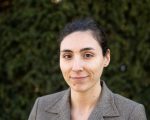Adish Singla, head of the MPI-SWS Machine Teaching Research group, has been awarded a 2021 ERC Starting Grant. Over the next five years, his project TOPS will receive funding of 1.5 million euros for research on "Machine-Assisted Teaching for Open-Ended Problem Solving: Foundations and Applications". Read more about the TOPS project below.
ERC grants are the most prestigious and the most competitive European-level awards for ground-breaking scientific investigations. This year, less than 10% of all ERC Starting Grant applicants across all scientific disciplines received the award, ...
Adish Singla, head of the MPI-SWS Machine Teaching Research group, has been awarded a 2021 ERC Starting Grant. Over the next five years, his project TOPS will receive funding of 1.5 million euros for research on "Machine-Assisted Teaching for Open-Ended Problem Solving: Foundations and Applications". Read more about the TOPS project below.
ERC grants are the most prestigious and the most competitive European-level awards for ground-breaking scientific investigations. This year, less than 10% of all ERC Starting Grant applicants across all scientific disciplines received the award, with only 23 awardees in Computer Science across all of Europe! You can find more information about ERC Starting Grants awarded this year at
https://erc.europa.eu/news/StG-recipients-2021.
The TOPS Project
Computational thinking and problem solving skills are essential for everyone in the 21st century, both for students to excel in STEM+Computing fields and for adults to thrive in the digital economy. Consequently, educators are putting increasing emphasis on pedagogical tasks in open-ended domains such as programming, conceptual puzzles, and virtual reality environments.
When learning to solve such open-ended tasks by themselves, people often struggle. The difficulties are embodied in the very nature of tasks being open-ended: (a) underspecified (multiple solutions of variable quality), (b) conceptual (no well-defined procedure), (c) sequential (series of interdependent steps needed), and (d) exploratory (multiple pathways to reach a solution). These struggling learners can benefit from individualized assistance, for instance, by receiving personalized curriculum across tasks or feedback within a task. Unfortunately, human tutoring resources are scarce, and receiving individualized human-assistance is rather a privilege. Technology empowered by artificial intelligence has the potential to tackle this scarcity challenge by providing scalable and automated machine-assisted teaching. However, the state-of-the-art technology is limited: it is designed for well-defined procedural learning, but not for open-ended conceptual problem solving.
The TOPS project will develop next-generation technology for machine-assisted teaching in open-ended domains. We will design novel algorithms for assisting the learner by bridging reinforcement learning, imitation learning, cognitive science, and symbolic reasoning. Our theoretical foundations will be based on a computational framework that models the learner as a reinforcement learning agent who gains mastery with the assistance of an automated teacher. In addition to providing solid foundations, we will demonstrate the performance of our techniques in a wide range of pedagogical applications.


